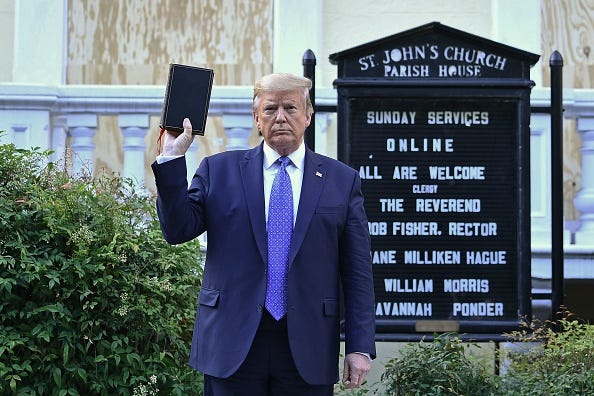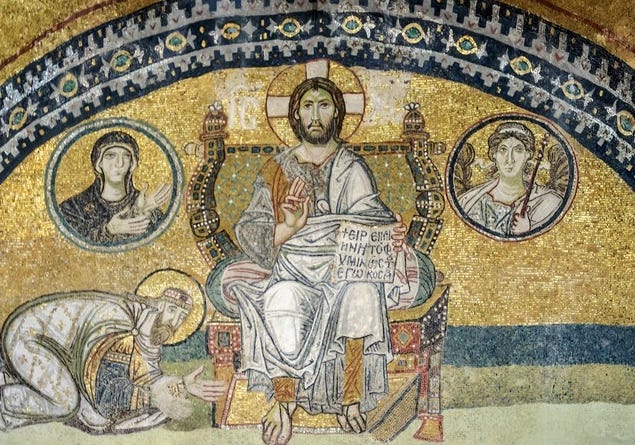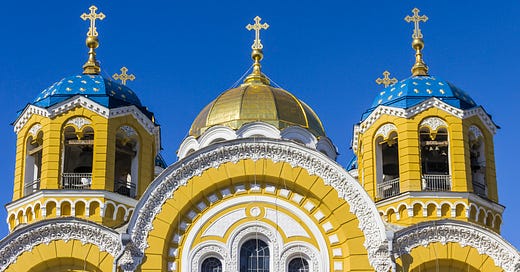

Discover more from The Cottage
A feature in this Sunday’s New York Times revisited a 2016 Donald Trump speech as key to his continuing appeal with white evangelicals. After claiming Christianity was “under tremendous siege,” Trump said he would use the White House to defend the faith. “Christianity will have power,” he promised. “If I’m there, you’re going to have plenty of power.”
The article is insightful – and if you are interested in why white evangelicals persist in supporting Trump, and how they feel he has kept his promises to them, please make sure to read it. But it also had me ruminating on that single line: Christianity will have power.

Power. We don’t often like to think of religion and power, imagining religion at its best when it eschews power. When we talk about Christianity as “powerful,” it generally isn’t a compliment. It is often to criticize wealthy, influential institutions, point out hypocrisy, and underscore the tension between might and faith.
However difficult the relationship between power and faith, Christianity is concerned with power. Jesus was not a powerful person. He was born and lived in a client state of the ancient Roman Empire, a Jewish peasant in a land ruled by a puppet king and a colonial governor. The Jews were functionally enslaved to a political and economic system that cared nothing for them as human beings, taking everything and giving little in return.
Despite this wretched situation, Jesus preached that the poor were blessed, the last would be first, and all debts should be forgiven. He implied that one shouldn’t pay taxes to Caesar, and that everyone was welcome at God’s table. (He might have gotten some of these ideas from his mother, who believed that the powerful would be cast from their thrones.) Crazy stuff, really. But when Jesus stirred up hopes for something called the Kingdom of God, the Romans dispatched him to a phony trial and a gruesome execution – reminding his friends to whose kingdom they were truly subject. In those days, the Emperor was called Lord and Savior and was believed to hold the earth in his hands. No upstart lords or saviors allowed.
Soon after Jesus died, however, his followers proclaimed that he had been resurrected and still lived, thus insisting their God was more powerful than the emperor. To prove the point, they said and did all sorts of wildly unpredictable things – like preaching the walls between men and women, Jews and Gentiles, and the free and enslaved had been broken down by a God who loved all people. They offered hospitality to anyone who showed up on their doorsteps, cared for the sick and dying, refused to serve in the military, shared their goods, and created headaches for Roman authorities in the provinces. Because of this, they got tossed into prison, were exiled, sent into slavery, had lands seized, and were executed by the state.
They weren’t, however, powerless. They exercised an alternative power to that of empire – the power of neighborly love, the power of nonviolence. The more the Romans used imperial power against them, the more people noticed, listened to their message, and joined their communities.
So it went, and Christianity spread. Until, of course, Rome saw that its own power was threatened by this nonsense and might be saved by bringing the Christians into political power – by setting them up as ministers in the imperial court, by making their religion the religion of the state.
It is hard to blame early Christians for accepting the offer. After all, their churches had grown, but it had been a pretty miserable three centuries before the Emperor Constantine (whose own religious beliefs have long puzzled historians) dangled the apple of political power in front of them. It would be nice to be safe, and they wouldn’t have to worry about their daughters marrying one of those pagans next door. What good they could do inside the palace! What churches could be built! How many people they could feed! So much better to run the army than to be on the run from it. God promised an earthly kingdom. A few, small tweaks here and there, a couple heretics banished or burned at the stake, some theological compromises, kill a barbarian or two – what would it matter if they did God’s work?
Christians hailed Constantine as The Thirteenth Apostle, proving that rulers with dubious conversion stories could become champions of the faith.

Thus is western Christianity: The tale of a Jewish rabbi who taught the power of love and got killed, whose followers undermined the mighty Roman Empire and gained so much power that Jesus the peasant got lost in the bargain. Jesus was enthroned like Caesar. Christians built churches that covered the globe, even as they came to trust the rulers of this world. Power, lots of power, and the wealth that came along with it.
Occasionally, a renegade believer – like Francis, Martin Luther, or John Wesley – would mount a great spiritual movement to restore something resembling Jesus’s original teachings to a corrupted church. They would succeed for a time, only to discover that in winning they lost – and the whole power struggle between Jesus and empire would play itself out again over many centuries, with new voices in new nations, and, all too sadly, the same results as Christians succumb to the delusions of empire.
Christianity will have power isn’t the problem. Christianity doesn’t lack for power. Christianity has power. It always has. That’s the heart of the story.
The question is, the drama is: What kind of power do Christians choose?
Jesus proclaimed a faith with the power to bless the poor, heal the sick, welcome the stranger, and share a table with outcasts and sinners. The power to turn hierarchies upside down, the power of peace, the power of humility. The problem is, of course, that far too many Christians desire the power of empire instead. Like those interviewed in the New York Times story, they take the safety and security some Caesar offers them when they feel embattled and afraid. They forget that accepting the deal always comes with a price.










Succinct and on point. Exactly.
Thank you, Diana - spot on as usual.